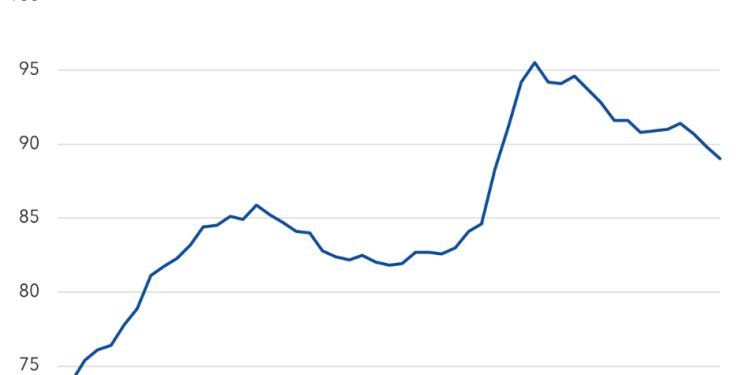Thailand Can Ease Household Debt Burden by Using Coordinated Approach
Thailand’s elevated level of household debt contributed to delaying the country’s post-pandemic recovery, which took longer than in other economies in the region. Borrowing surged during the health crisis as people struggled to meet basic needs, and lingering repayment burdens continue to constrain consumer spending.
Though household debt is down slightly from its peak during the pandemic, it is still historically high at 89 percent of economic output. In addition to weighing on consumption, this also hurts investment and the economy more broadly. That could fuel financial instability if the most vulnerable people and small enterprises continue to struggle to repay debt.
Such an economic drag from debt and the potential for more serious complications underscore the need for a coordinated and comprehensive remedy. We examine measures to reduce household debt, drawing on experiences in other countries, in our latest Article IV report, an annual health check of the economy. Durably reducing debt requires combining steps to lower the stock of obligations with policies to prevent the buildup of new borrowing, our case studies show.
Brazil, for example, helped borrowers in default renegotiate at a discount and settle their debts, providing renewed access to credit with the help of private lenders and minimal government spending. The program, which ran between July 2023 and May 2024, helped more than15 million people renegotiate loans worth 52 billion reais, or about 0.5 percent of gross domestic product.
Following a large increase in household debt during the Asian Financial Crisis in 2008, Malaysia took a number of steps to reduce the associated risks. Specific measures included introducing responsible lending guidelines, risk-informed loan pricing, and stricter credit card requirements, in order to deal with personal loans and credit card debt involving non-bank financial institutions.
Korea emphasized protecting the broader financial system from the risks of household debt by taking over a failing credit card company and providing several ways for borrowers to resolve their debts. These measures helped reduce the credit card delinquency ratio by three-quarters over four years through 2006.
Additionally, countries like Ireland and the United States used relatively simple and fast debt settlement and bankruptcy options to help struggling borrowers. Debt relief and forgiveness helped the most vulnerable debtors in several emerging economies, including Croatia and the Czech Republic.
Debt reduction efforts
In Thailand, the authorities have taken important steps to help reduce household debt. These include offering repayment assistance, introducing debt restructuring programs, improving regulations, and providing financial education.
One notable initiative is Khun Soo, Rao Chuay, which translates as You Fight, We Help. The program introduced in December 2024 provides individuals and small businesses with lower monthly payments, interest suspension and forgiveness, and loan restructuring.
The Bank of Thailand also set new guidelines in January 2024 to ensure responsible lending. These guidelines strengthened consumer protection and helped restructure more than 7 million accounts. Other measures, such as limiting how much people can borrow relative to their assets, aim to further reduce debt and make it more manageable.
Improving financial literacy is key to preventing excessive borrowing. Thailand’s government is working with schools to require financial education. Limiting aggressive credit card marketing would also help. Financial institutions can play a role by providing better information to borrowers and offering debt help programs.
Beyond these efforts, our country case studies suggest that it is important to tackle persistent and non-viable debts. In Thailand, it is very difficult for a borrower who has defaulted to regain access to formal bank loans. Therefore, it would be important to make it easier for people to resolve personal debt issues and create socially acceptable bankruptcy systems that are simple, effective, and fair. The government should prioritize the most vulnerable households and collaborate with private companies to reduce the cost of tackling this debt.
Sources of debt
Addressing household debt is important—as is doing so in a way that doesn’t hurt economic growth. History shows that acting too quickly, without attention to all the economic interconnections, can hurt the banking sector, reduce credit availability, and slow consumer spending and business investment. Policies should be balanced with safeguarding economic stability.
More fundamentally, Thailand must address a main reason that debt remains elevated. More than half of workers aren’t formally employed, which deprives them of job security and social protection. This makes them particularly vulnerable to economic shocks that reduce their income as they need to borrow just to make ends meet. Strengthening social protection would not only help reduce inequality but also curb household debt, especially for informal loans, which could mitigate financial stability risks.









